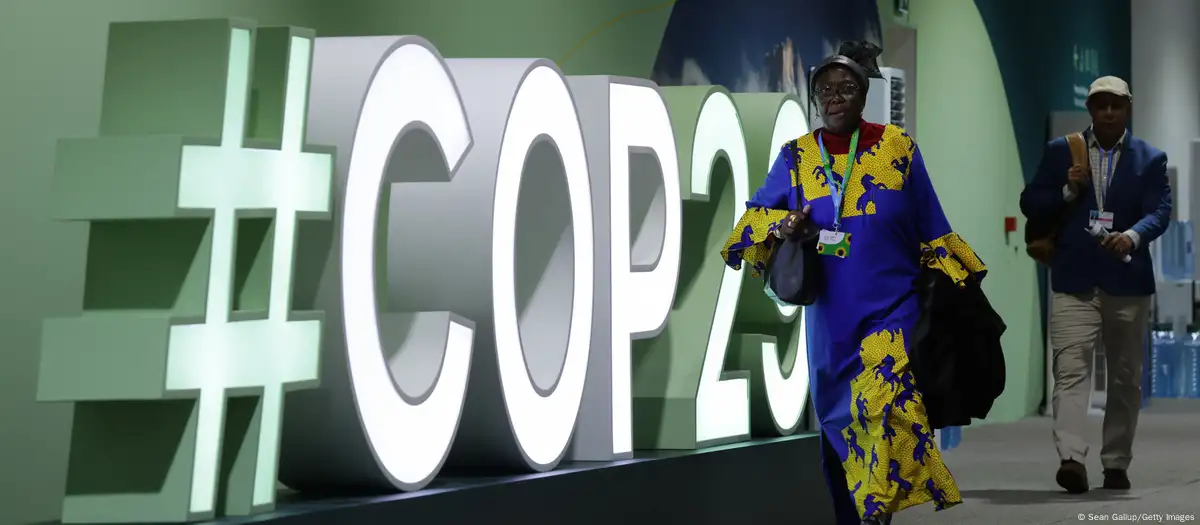
Credit: Sean Gallup
As the world grapples with the escalating impacts of climate change, the 29th Conference of Parties (COP29) held in Baku, Azerbaijan, from November 11 to 22, 2024, has emerged as a crucial platform for African nations to assert their leadership and advocate for urgent climate action. With Africa facing disproportionate climate challenges despite contributing minimally to global emissions, the conference has highlighted the continent’s need for enhanced climate financing, innovative solutions, and a commitment to sustainable development.
The Urgency of Climate Action
African nations are on the brink of a climate crisis, with rising temperatures, extreme weather events, and economic losses that threaten their development. According to the UN Economic Commission for Africa (ECA), climate-related disasters are pushing millions into poverty, with estimates indicating that up to 118 million people could be exposed to droughts and floods by 2030.
Claver Gatete, Executive Secretary of the ECA, emphasized that “the cost of inaction is far greater than the investment required to build a resilient and prosperous future for Africa”.
At COP29, African leaders are advocating for a New Collective Quantified Goal (NCQG) on climate finance, which is expected to be finalized during the conference. This goal aims to secure at least $2.8 trillion in funding between 2020 and 2030 to meet the continent’s Nationally Determined Contributions (NDCs) under the Paris Agreement.
The urgency for financial support is underscored by the fact that African economies are losing an average of 5% of GDP annually due to climate impacts
Harnessing Africa’s Resources for Sustainable Growth
Africa is rich in natural resources that can be leveraged for sustainable development. The continent possesses vast deposits of critical minerals essential for renewable energy technologies, such as lithium and cobalt. These resources are crucial not only for Africa’s economic transformation but also for the global transition to clean energy.
UN Secretary-General António Guterres called on world leaders to support Africa’s clean energy transition and highlighted the potential of renewable energy to drive industrialization and improve living standards across the continent.
The African Group of Negotiators is pushing for innovative financing structures, including debt-for-nature swaps and private sector investments, which could provide much-needed capital for adaptation projects.
By embracing community participation and Indigenous knowledge systems, African nations can enhance their adaptive capacities and build resilience against climate impacts.
Addressing Climate Injustice
Despite being among the least responsible for climate change, African countries bear the brunt of its consequences. Guterres noted that developed nations must double their adaptation financing commitments to $40 billion annually by 2025 and contribute significantly to the newly established Loss and Damage Fund.
The moral imperative for climate justice is clear: wealthier nations must fulfill their promises and support Africa’s efforts to combat climate change.
A Shift in Negotiation Strategies
To achieve meaningful outcomes at COP29, African countries must refine their negotiation strategies. This includes collective bargaining based on the continent’s vast resources—agriculture, minerals, forests, and marine assets—as leverage for securing better financing deals.
Past experiences have shown that ambitious commitments often go unmet; therefore, clarity in what constitutes climate finance is essential. African negotiators are advocating for transparent accounting rules to ensure that funds labeled as climate finance genuinely contribute to adaptation and mitigation efforts.
Conclusion: The Path Forward
COP29 represents a pivotal moment for Africa as it seeks not only to address immediate climate challenges but also to position itself as a leader in global efforts toward sustainability. By harnessing its natural resources responsibly and advocating for equitable financing mechanisms, Africa can transform its vulnerabilities into opportunities for growth. As Guterres stated, “Africa belongs at the forefront of the renewables revolution,” highlighting the continent’s potential to lead in sustainable development while securing a prosperous future for its people.
In this context, it is imperative that global partners respond decisively to Africa’s call for action. The time has come for collaborative efforts that prioritize both environmental sustainability and economic growth—ensuring that Africa not only survives but thrives in an era defined by climate change.














 and then
and then